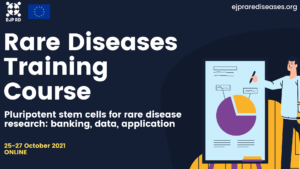- 25 octobre 2021 - 13:30
- Online
Registration is open here.
Registration deadline: September 27th


Rare disease (RD) is one area where national and international multidisciplinary collaborations are valuable to overcome some of the present challenges in research. Access to infrastructures, collaborative research and policy platforms, virtual platforms for data integration are some examples of means to overcome bottlenecks for diagnosis and treatment of RD patients. One of such infrastructures are biobanks which are important drivers for creating scientific knowledge by collecting, storing and distributing human biological samples and associated data with quality assurance management systems and following ethical and legal guidelines.
Biological samples can be used as valuable starting materials for generating cellular models of disease. This can occur, for example, by generating induced pluripotent stem cell (iPSC) lines from cells and tissues, and then differentiating the iPSC lines into specific cell types for disease modelling or drug screening. Advantageously, iPSC lines can be generated from any individual, are a renewable cell resource, and can be used to produce cell types that are difficult to access or obtain from native tissues (e.g. specialized brain cell types). In the present biobank training, we aim to provide an overview on how human pluripotent stem cells can be used as research tools.
The training is aimed at biomedical researchers, medical professionals, and biobank managers who want to learn about the application of human pluripotent stem cell (hPSC) lines in rare disease research. Practical considerations from start to finish will be presented, including the sourcing of biological material for pluripotent stem cell generation, making pluripotent stem cell lines, hPSC cell line banking, data management, and methods for genetically engineering and differentiating hPSC lines. We will address the topic from diverse points of view, including representatives from biomedical ethics, patient organisations, applied research and industry.
This training is composed of four modules:
The first module will introduce human pluripotent stem cell data management and banking. Emphasis will be placed on induced pluripotent stem cells. Stem cell data management will be presented by the human pluripotent stem cell registry (hPSCreg), and the European Bank for induced Pluripotent Stem Cells (EBiSC) will describe their operations and interactions with the rare disease community. Best practices and protocols for generating iPSC cells will be outlined. To round out the first module, a rare disease researcher will share his experiences in the application of iPSCs for disease modelling.
In the second module, the focus will be placed on the quality of pluripotent stem cell lines and methods used when developing the lines for end applications. Presentations will cover induced pluripotent stem cell quality attributes and cryopreservation techniques for sustainable banking. Gene editing approaches for iPSC lines to create “tool lines” will be described. Finally, a case of hPSC line differentiation will illustrate how specific cell types can be generated and assessed for functionality.
In the third module, the quality of data in terms of interoperability and access will be presented by representatives from EJP-RD. Biosample data management in terms of FAIR data (Findable, Accessible, Interoperable and Re-usable data) and specific standards for the rare disease community will be outlined by an EJP-RD FAIR data steward. FAIR in action will be demonstrated by examples of interoperability within the virtual platform and in particular the RD-Connect sample catalogue. Informed consent and data protection provisions will be covered, and lessons learned from the experience of European Reference Networks will be presented. To close this session, specific ethical considerations for human pluripotent stem cells will be described by an expert from the stem cell field.
In the fourth and final module, we look ahead to issues facing the future sustainability of iPSC biobanks. Careful consideration of ELSI issues from the outset will determine the applicable downstream uses of hPSC cells, such as material transfer agreements and third party obligations arising from intellectual property issues. Presentations will cover iPSCs in translational research and the viewpoint on sustainability from the biobanking community, followed by an industry perspective from an EFPIA partner.
The list of speakers will be updated soon.
Click here to see the preliminary programme.
Register here before September 27th.
EVENT INFO :
- Start Date:25 octobre 2021
- Start Time:13:30
- End Date:27 octobre 2021
- End Time:11:45
- Location:Online
